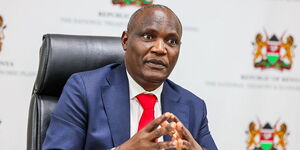Thousands of disgruntled members of the Kenya National Police DT Sacco are demanding action over what they allege is severe mismanagement of their savings, resulting in losses amounting to millions of shillings.
In a damning petition to the Sacco Societies Regulatory Authority (SASRA), members are seeking an extensive audit and the removal of the Sacco’s top brass, accusing them of plundering funds and flaunting unexplained wealth.
The Kenya Police Sacco, once a beacon of financial empowerment for police officers, is now mired in controversy. Members have lost faith in the Board of Directors and the Chief Executive Officer, calling for their immediate resignation.
Why it matters: The challenges confronting the Kenya Police Sacco reflect a broader crisis in the cooperative movement, as many Saccos struggle with leadership challenges. This comes also as 60 Saccos collectively shed Ksh 970 million in deposits last year.
This alarming trend, marked by mass member exits, has prompted the Sacco Societies Regulatory Authority (SASRA) to urge the sacco's management to address the apathy driving these withdrawals, which jeopardises the stability of the sector.
Dig deeper: The petition, dated September 3 and seen by Kenyans.co.ke, paints a picture of a Sacco crippled by internal rot, where nepotism and reckless spending have allegedly become the norm.
A key point of contention is a mobile banking system, which members claim was acquired at a staggering cost of Ksh600 million, with annual maintenance costs of Ksh300 million. Despite this hefty investment, the system is riddled with failures, raising questions about the integrity of the deal.
“The system’s frequent downtimes have become a source of frustration, with no clarity on what was truly lost in this debacle.” reads the petition.
Members are also raising alarms over the extravagant lifestyles of Sacco leaders, claiming that the wealth displayed by Board members far exceeds their known income.
“Board members are driving high-end cars and building multi-million homes. This opulence is a slap in the face to struggling members,” reads the petition.
The document details how some leaders have erected lavish homes in Kitengela and Ngong, while others flaunt cash openly, creating suspicions about the true source of their riches.
Accusations of nepotism further fuel the discontent. The petition alleges that over 70 per cent of Sacco employees are directly related to Board members, turning the institution into a family affair. “It’s a blatant misuse of power,” states the petition. Specific instances are cited, including a director whose brother is employed in a key department, and another Board member whose daughter-in-law manages a sensitive financial position.
The Sacco’s financial health is also under scrutiny, with calls for a forensic audit to uncover the true extent of the alleged mismanagement. The petition highlights questionable budget allocations, including inflated expenses on education, CSR, marketing, and legal services. The most shocking revelation is a recent cybersecurity incident.
“This lack of transparency is unacceptable. Sacco funds are disappearing with no accountability,” the petition states. “Members deserve to know where their money is going and why the Sacco’s finances are in such disarray.”
What the government is saying: In response, the Sacco’s management has dismissed the allegations as baseless. CEO Solomon Angutsa recently defended the mobile system, downplaying the issues as minor outages that have been resolved.
“We had a temporary service disruption, which has since been fixed. Our members are now fully served at optimal levels,” Angutsa told The Standard. The CEO maintained that the Sacco remains committed to upholding its core principles and serving its members with integrity.
The Sacco Societies Regulatory Authority (SASRA), tasked with overseeing Sacco governance, confirmed receiving the members' petition but noted that no formal complaints had been filed. The regulator acknowledged the recent technical issues with the system and assured members that corrective measures were being taken.












